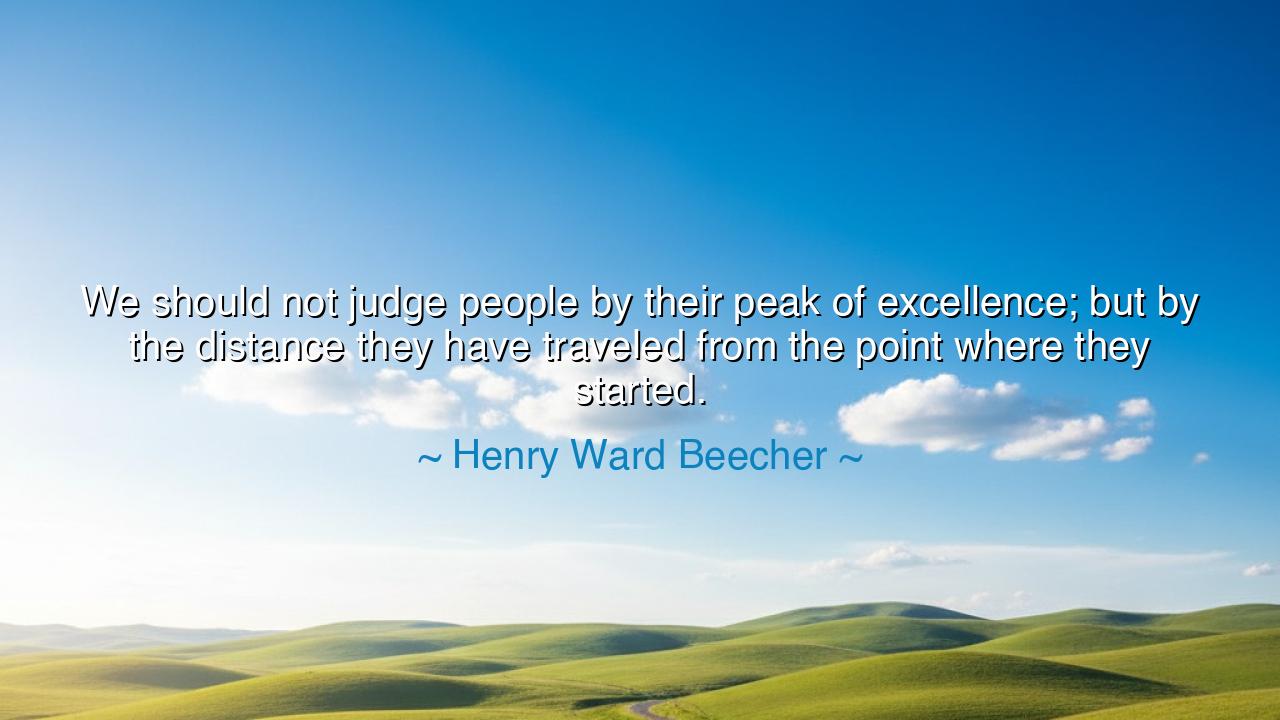
We should not judge people by their peak of excellence; but by
We should not judge people by their peak of excellence; but by the distance they have traveled from the point where they started.






The words of Henry Ward Beecher, “We should not judge people by their peak of excellence; but by the distance they have traveled from the point where they started,” shine with compassion and justice. He teaches us that true greatness is not found merely in the summit of achievement, but in the journey that carried a soul from humble beginnings to higher ground. The measure of a man is not only in what he has attained, but in the struggle he has endured and the progress he has carved out of hardship.
The ancients knew this wisdom well. In the games of Greece, the victor was crowned, but the people also honored the athlete who, though he did not win, showed fierce courage in rising above his own limits. Likewise, in philosophy, virtue was not measured by perfection, but by striving toward the good. Beecher reminds us that each life begins at a different place, and so to judge only by the peak is to miss the true weight of the distance traveled.
History bears luminous witness. Consider Frederick Douglass, born into slavery, denied schooling, and beaten for daring to learn. Though many in his age looked only to the polished statesman or the wealthy magnate, Douglass’s true greatness was revealed in how far he had risen—from the chains of bondage to the heights of oratory, statesmanship, and moral leadership. His life embodies Beecher’s truth: the glory lies not in the peak alone, but in the vast gulf overcome.
Beecher’s words also warn against shallow judgment. The one born into wealth and privilege may shine with apparent excellence, yet his journey may be but a few steps on a path already laid. Meanwhile, the one who struggles from the depths of poverty or despair, even if he does not rise as high, has traveled a far greater road. To honor only the summit is to be blinded by appearances; to honor the distance is to see with justice.
Let the generations remember: the worth of a soul lies not only in its shining moment, but in the long and hidden struggle that carried it there. Excellence is a crown, but endurance is the foundation. Measure not the man only by his peak, but by the valley from which he has risen. For it is in the distance traveled that we glimpse the true strength of spirit, the courage of the heart, and the majesty of human resilience.






DMTu Danh Mai
I like the idea of appreciating how far someone has come rather than just where they end up. It’s a reminder that growth often comes with struggles and setbacks. But can we ever really compare people’s journeys equally? Some may face more obstacles than others, and some might start from a much higher point. How do we ensure we don’t diminish someone's growth just because their starting point was different?
N720 Tran Hieu Ngan 7.1
This idea resonates with me, especially when I think about how often we compare people to the best versions of themselves or others. But at the same time, I think there’s a danger in underestimating the value of reaching a peak of excellence. If we focus too much on the journey, can we risk overlooking the importance of excellence itself? Is there a point when we should celebrate peak achievements too?
UNUt Nguyen
This quote seems so empathetic. It suggests we look at people through a lens of understanding and growth rather than just accomplishment. But does this mean that we should never judge someone’s potential based on their current achievements? How do we decide when to support someone who is still in the process of growth versus someone who might not be showing any improvement at all?
GDGold D.dragon
I find this quote powerful because it shifts the focus from end results to the journey. It makes me think about the people in my life who may not be at the top, but have overcome so much to get where they are. But is it always possible to know someone’s full story? How can we truly understand the distance someone has traveled without fully knowing their background or struggles?
Ssuong
This quote really challenges the way we often judge success. It reminds me that everyone starts from a different place and that what might seem like a small step for one person could be a huge leap for another. However, I also wonder if focusing too much on someone's journey could let them off the hook for not reaching a certain level of achievement. Where’s the balance between effort and outcome?